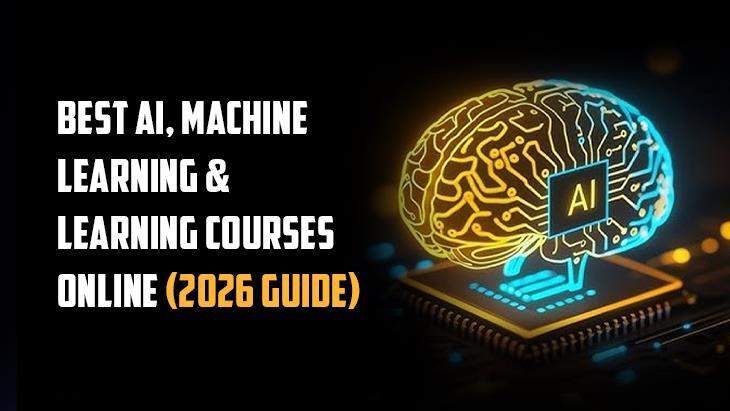AI engineers are highly sought-after due to the immense potential of artificial intelligence in enhancing and streamlining various human tasks. From speech recognition and image processing to business process management and disease diagnosis, AI offers limitless possibilities for improvement. If you possess a technical inclination and a software programming background, pursuing a rewarding career as an AI engineer could be an excellent choice. Let's explore the path to becoming an AI engineer and how you can embark on this lucrative journey.
What Is Artificial Intelligence?
Artificial Intelligence (AI) refers to the simulation of human intelligence in machines that are programmed to think and learn like humans. It involves creating intelligent machines that can perceive, reason, learn, and solve problems autonomously, without explicit human intervention. AI encompasses a wide range of techniques, algorithms, and technologies that enable machines to exhibit cognitive abilities and perform tasks that typically require human intelligence.
There are different forms of AI, including:
1. Narrow AI: Narrow AI, also known as weak AI, is designed to perform specific tasks within a limited domain. Examples include voice assistants like Siri and Alexa, image recognition systems, and recommendation algorithms used by online platforms.
2. General AI: General AI refers to AI systems that possess the ability to understand, learn, and perform any intellectual task that a human can do. This level of AI has not been achieved yet and remains an area of ongoing research and development.
3. Machine Learning: Machine learning is a subset of AI that focuses on algorithms and statistical models that enable machines to automatically learn from and improve upon data without being explicitly programmed. It allows machines to analyze vast amounts of data, identify patterns, and make predictions or decisions based on that analysis.
4. Deep Learning: Deep learning is a subfield of machine learning that involves artificial neural networks inspired by the structure and function of the human brain. Deep learning algorithms can process and analyze complex data, such as images, speech, and text, enabling tasks like image recognition, natural language processing, and autonomous driving.
AI finds applications in various domains, including healthcare, finance, transportation, education, entertainment, and more. It is utilized to automate repetitive tasks, optimize processes, make predictions, enhance decision-making, and improve user experiences.
However, it's important to note that AI is a rapidly evolving field, and its development raises ethical, societal, and privacy considerations. As AI technologies advance, it is crucial to ensure responsible and ethical implementation to harness the benefits while addressing potential challenges.
What Does an AI Engineer Do?
An AI engineer is responsible for designing, developing, and implementing artificial intelligence solutions and systems. Their primary focus is on creating intelligent machines and systems that can perform tasks that typically require human intelligence. Here are some key responsibilities and activities of an AI engineer:
1. Research and Development: AI engineers stay updated with the latest advancements in the field of artificial intelligence, machine learning, and related technologies. They conduct research to explore new algorithms, techniques, and approaches to solve complex problems and improve AI systems.
2. Algorithm Development: AI engineers develop and fine-tune algorithms and models that enable machines to learn, reason, and make decisions. They work on machine learning algorithms such as supervised learning, unsupervised learning, and reinforcement learning, as well as deep learning models.
3. Data Preparation and Analysis: AI engineers work with large datasets to train AI models. They preprocess and clean data, select relevant features, and perform data analysis to identify patterns and extract meaningful insights that can be used to train AI systems effectively.
4. Model Development and Training: AI engineers design, develop, and train AI models using programming languages and frameworks such as Python, TensorFlow, PyTorch, or scikit-learn. They select appropriate models, optimize hyperparameters, and validate the performance of models using various evaluation techniques.
5. Deployment and Integration: AI engineers deploy AI models and systems into production environments. They ensure scalability, reliability, and performance by optimizing models for deployment, integrating AI systems with existing infrastructure, and monitoring the performance of AI applications.
6. Performance Optimization: AI engineers optimize the performance of AI systems by improving efficiency, reducing computational complexity, and implementing techniques such as model compression, quantization, and parallel processing.
7. Testing and Evaluation: AI engineers conduct rigorous testing and evaluation of AI systems to ensure accuracy, robustness, and reliability. They perform quality assurance checks, conduct experiments, and validate AI systems against benchmarks and real-world scenarios.
8. Collaboration and Communication: AI engineers collaborate with cross-functional teams, including data scientists, software engineers, and domain experts, to understand business requirements, translate them into AI solutions, and communicate the capabilities and limitations of AI systems to stakeholders.
9. Continuous Learning: AI engineers keep abreast of the latest trends, research papers, and developments in the AI field. They participate in conferences, workshops, and online communities to expand their knowledge and skills in emerging AI technologies.
Overall, AI engineers play a crucial role in advancing the capabilities of AI systems, leveraging their technical expertise and problem-solving skills to create intelligent solutions that address complex challenges across various industries.
How to Become an Artificial Intelligence Engineer?
Becoming an Artificial Intelligence (AI) engineer requires a combination of education, technical skills, practical experience, and continuous learning. Here are some steps to guide you on the path to becoming an AI engineer:
1. Gain a Strong Foundation in Mathematics and Programming:
* Develop a solid understanding of mathematics, including linear algebra, calculus, probability, and statistics. These concepts form the basis of many AI algorithms.
* Learn programming languages commonly used in AI, such as Python and R, as well as libraries and frameworks like TensorFlow, PyTorch, and scikit-learn.
2. Earn a Relevant Degree or Certification:
* Pursue a bachelor's or master's degree in computer science, data science, or a related field with a focus on AI or machine learning. Alternatively, you can opt for online courses and certifications offered by reputable institutions or platforms like Coursera, edX, or Udacity.
3. Study AI and Machine Learning Concepts:
* Familiarize yourself with the fundamentals of AI, machine learning, and deep learning. Understand various algorithms, techniques, and neural network architectures.
* Learn about supervised learning, unsupervised learning, reinforcement learning, and other subfields of machine learning.
4. Gain Hands-on Experience with Projects:
* Undertake practical AI projects to apply your knowledge and build a portfolio. Work on real-world datasets, implement machine learning algorithms, and develop AI models.
* Participate in Kaggle competitions or similar platforms to tackle diverse AI problems and learn from the community.
5. Master AI Tools and Technologies:
* Acquire proficiency in AI frameworks, libraries, and tools such as TensorFlow, PyTorch, scikit-learn, Keras, and Jupyter Notebooks.
* Learn about data preprocessing, feature selection, model training, hyperparameter tuning, and evaluation techniques.
6. Stay Updated with the Latest Developments:
* Keep abreast of the latest research papers, advancements, and trends in the AI field. Follow conferences, journals, and online resources to stay informed.
* Engage with the AI community, join forums, participate in discussions, and collaborate with peers to expand your knowledge and network.
7. Specialize and Continuously Learn:
* Explore specific domains within AI, such as natural language processing (NLP), computer vision, robotics, or reinforcement learning, and develop expertise in those areas.
* Embrace lifelong learning and continuously update your skills as AI technologies evolve.
8. Apply for AI Engineer Roles:
* Search for job opportunities as an AI engineer, machine learning engineer, or data scientist. Highlight your educational background, practical projects, and relevant skills in your resume and cover letter.
* Prepare for technical interviews by reviewing AI concepts, algorithms, and problem-solving techniques.
Remember, becoming an AI engineer is a continuous journey that requires dedication, curiosity, and a passion for learning. Stay persistent, explore hands-on projects, and seek opportunities to apply your AI skills in real-world scenarios.
Artificial Intelligence Qualification/Education
To pursue a career in Artificial Intelligence (AI), there are several educational pathways and qualifications you can consider. Here are some common options:
1. Bachelor's Degree in Computer Science or Data Science:
A bachelor's degree in computer science or data science provides a strong foundation in programming, algorithms, and data analysis, which are essential for AI. Look for programs that offer courses in AI, machine learning, and related fields.
2. Master's Degree in Artificial Intelligence or Machine Learning:
A master's degree specifically focused on AI or machine learning can provide a deeper understanding of advanced concepts and techniques. These programs often cover topics such as neural networks, deep learning, natural language processing, and computer vision.
3. Graduate Certificate Programs:
Graduate certificate programs offer specialized training in AI and machine learning. These programs are shorter in duration compared to master's degrees and can be a good option if you want to enhance your AI skills without committing to a full degree program.
4. Online Courses and MOOCs:
Online platforms like Coursera, edX, and Udacity offer a wide range of AI-related courses and Massive Open Online Courses (MOOCs) from top universities and industry experts. These courses are flexible and allow you to learn at your own pace.
5. PhD in Artificial Intelligence or Machine Learning:
A PhD program is suitable for those interested in pursuing advanced research and development in AI. It involves in-depth study, conducting original research, and contributing to the field's knowledge base.
Apart from formal education, it's important to engage in practical projects, hands-on experience, and continuous learning to build your AI expertise. Participating in AI competitions, contributing to open-source projects, and gaining industry experience through internships or work placements can significantly enhance your qualifications.
Additionally, professional certifications from reputable organizations, such as IBM, Google, and Microsoft, can validate your AI skills and knowledge. Certifications like the Google Cloud Certified - Professional Data Engineer or the Microsoft Certified: Azure AI Engineer Associate demonstrate your competence in specific AI domains.
Remember, the field of AI is rapidly evolving, and staying updated with the latest advancements through research papers, conferences, and online resources is crucial to remain at the forefront of this dynamic industry.
Responsibilities of an AI Engineer
The responsibilities of an AI engineer may vary depending on the organization and specific role, but here are some common responsibilities associated with the position:
1. Designing and Developing AI Systems: AI engineers are responsible for designing and developing AI systems, including machine learning models, deep learning algorithms, and other AI-driven solutions. This involves understanding the business requirements, selecting appropriate AI techniques, and developing effective AI models and algorithms.
2. Data Preparation and Analysis: AI engineers work with large datasets, performing data preprocessing, cleaning, and transformation tasks to ensure data quality and suitability for training AI models. They analyze and explore datasets to identify patterns, correlations, and insights that can be leveraged for AI applications.
3. Model Training and Evaluation: AI engineers train AI models using machine learning and deep learning techniques. This includes selecting and implementing appropriate algorithms, tuning hyperparameters, and optimizing model performance. They also evaluate and validate the trained models using relevant evaluation metrics and techniques.
4. Integration and Deployment: AI engineers integrate AI models and solutions into existing software systems or platforms. They ensure seamless integration, scalability, and performance of AI systems and work closely with software engineers and IT teams for deployment and maintenance.
5. Performance Optimization: AI engineers optimize the performance of AI systems by identifying and implementing techniques to improve efficiency, speed, accuracy, and resource utilization. This may involve techniques such as model compression, quantization, parallelization, or optimization for specific hardware or platforms.
6. Testing and Validation: AI engineers conduct rigorous testing and validation of AI systems to ensure their reliability, robustness, and accuracy. They design and execute test cases, analyze results, identify and address any issues or vulnerabilities, and ensure the overall quality of the AI systems.
7. Monitoring and Maintenance: AI engineers monitor the performance and behavior of deployed AI systems, collecting feedback and monitoring metrics to identify any anomalies or performance degradation. They continuously update and maintain the AI models and systems, incorporating improvements or modifications as required.
8. Research and Innovation: AI engineers stay up to date with the latest advancements and research in AI, machine learning, and related fields. They explore new algorithms, techniques, and technologies, and apply innovative approaches to solve complex problems and drive advancements in AI applications.
9. Collaboration and Communication: AI engineers collaborate with cross-functional teams, including data scientists, software developers, domain experts, and stakeholders. They effectively communicate and present the technical aspects, capabilities, and limitations of AI systems to non-technical stakeholders.
10. Ethical Considerations: AI engineers need to consider ethical implications and biases associated with AI systems. They should ensure fairness, transparency, and accountability in AI algorithms and decision-making processes.
It's important to note that the specific responsibilities may vary depending on the organization's focus, industry, and the stage of AI adoption. As AI technology evolves, new responsibilities and challenges may emerge, requiring AI engineers to continuously learn, adapt, and acquire new skills.
Skills Required to Become an AI Engineer
To become an AI engineer, you need a combination of technical skills, knowledge, and personal attributes. Here are some essential skills required to excel in the field:
1. Programming: Proficiency in programming languages is crucial for AI engineers. Python is commonly used for AI development due to its extensive libraries and frameworks like TensorFlow, PyTorch, and scikit-learn. Knowledge of other languages like R, Java, or C++ can also be valuable.
2. Mathematics and Statistics: Strong mathematical and statistical skills are essential to understand and develop AI algorithms. Linear algebra, calculus, probability theory, and statistics provide the foundation for machine learning, deep learning, and other AI techniques.
3. Machine Learning and Deep Learning: In-depth knowledge of machine learning algorithms, techniques, and concepts is vital. This includes supervised learning, unsupervised learning, reinforcement learning, and ensemble methods. Familiarity with deep learning architectures, such as neural networks, convolutional neural networks (CNNs), and recurrent neural networks (RNNs), is also important.
4. Data Preprocessing and Analysis: Ability to preprocess and analyze large datasets is crucial. This involves cleaning data, handling missing values, feature scaling, dimensionality reduction, and performing exploratory data analysis to gain insights and prepare data for AI modeling.
5. AI Frameworks and Libraries: Familiarity with AI frameworks and libraries such as TensorFlow, PyTorch, Keras, and scikit-learn is essential for developing and deploying AI models efficiently. Understanding how to leverage these tools to build, train, and evaluate models is crucial.
6. Problem-Solving and Algorithmic Thinking: AI engineers should possess strong problem-solving skills and an ability to think algorithmically. This involves breaking down complex problems into manageable components and designing effective algorithms to solve them.
7. Data Structures and Algorithms: Proficiency in data structures and algorithms is important for optimizing AI systems and efficiently processing large datasets. Understanding concepts like sorting, searching, graphs, and dynamic programming is valuable.
8. Software Engineering: Knowledge of software engineering principles, including version control, software development lifecycle, and testing methodologies, is important for developing robust and maintainable AI systems. Familiarity with agile development practices and collaboration tools is also beneficial.
9. Domain Knowledge: Having domain-specific knowledge can be advantageous, as it allows AI engineers to understand the context and requirements of AI applications in specific industries, such as healthcare, finance, or manufacturing.
10. Communication and Collaboration: Effective communication and collaboration skills are essential for AI engineers to work effectively in teams and convey complex technical concepts to non-technical stakeholders. Being able to translate business requirements into technical solutions and vice versa is valuable.
11. Lifelong Learning and Adaptability: AI is a rapidly evolving field, so a commitment to continuous learning and adaptability is crucial. Staying updated with the latest research, techniques, and industry trends is essential for AI engineers to remain competitive and deliver cutting-edge solutions.





Leave a reply